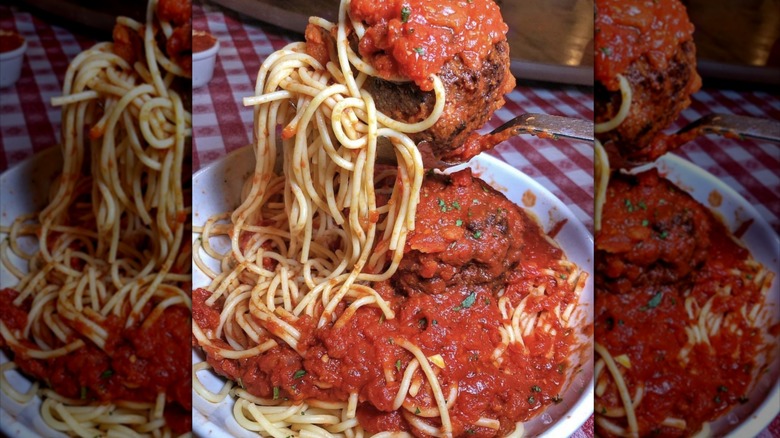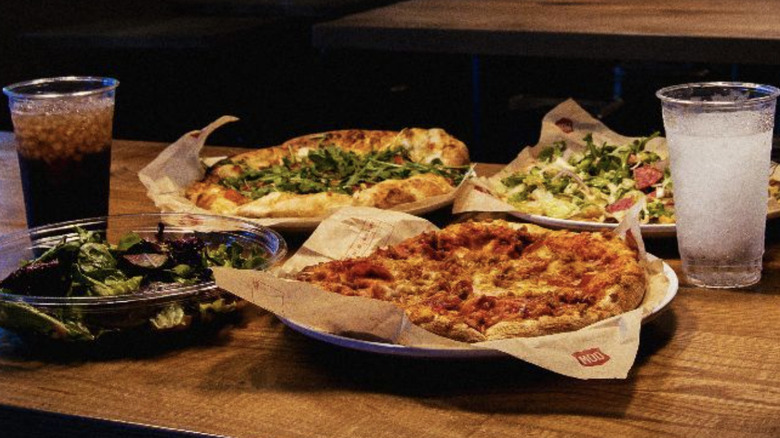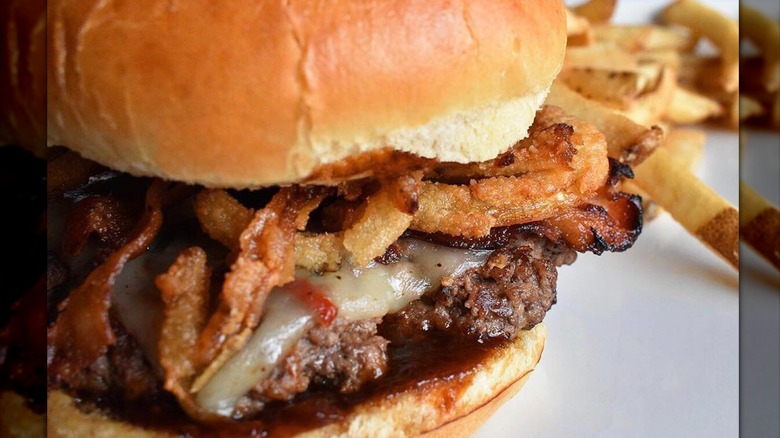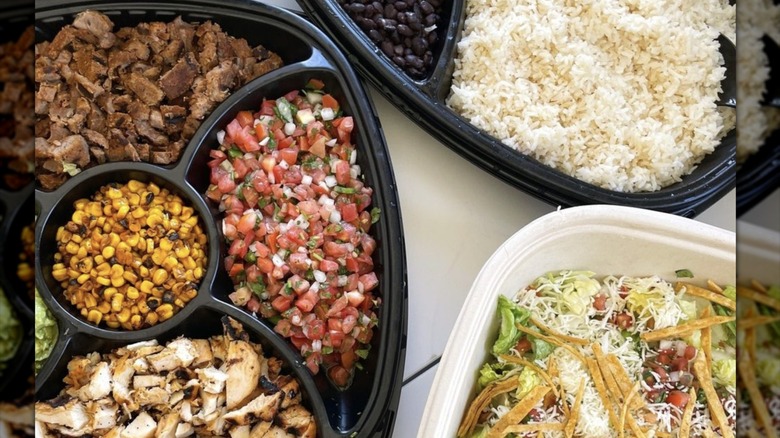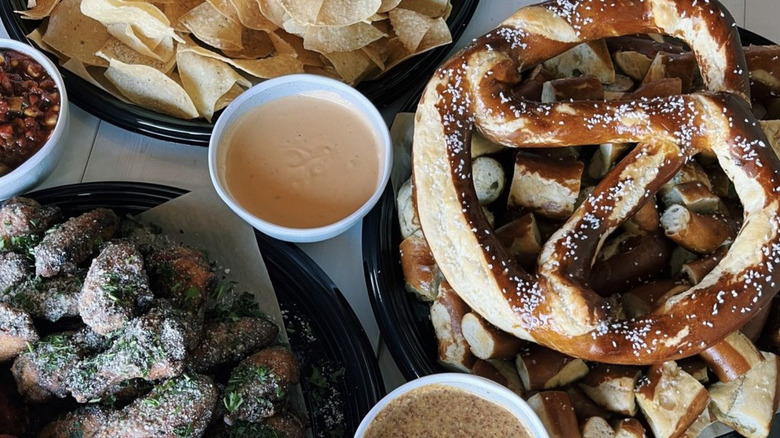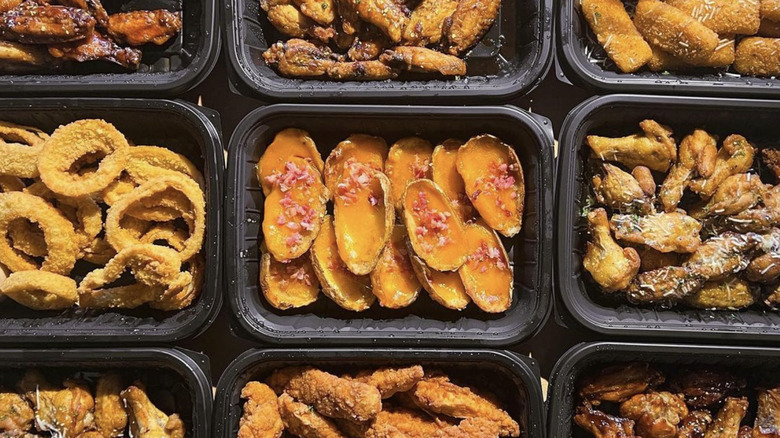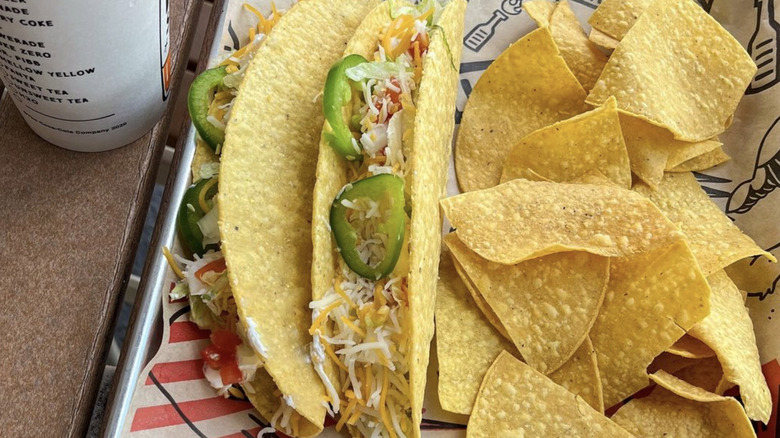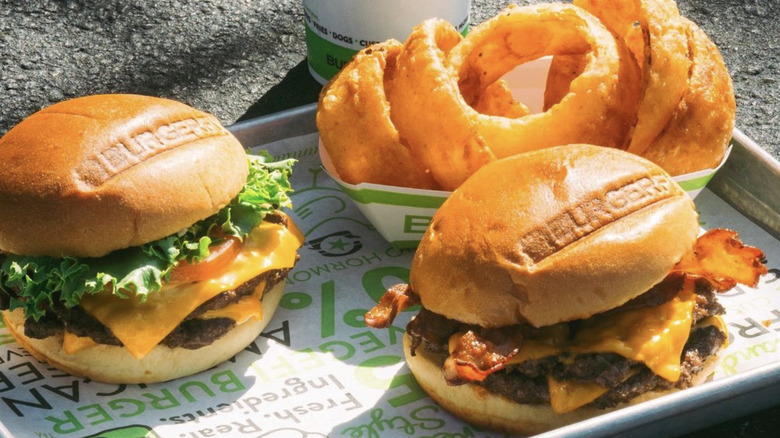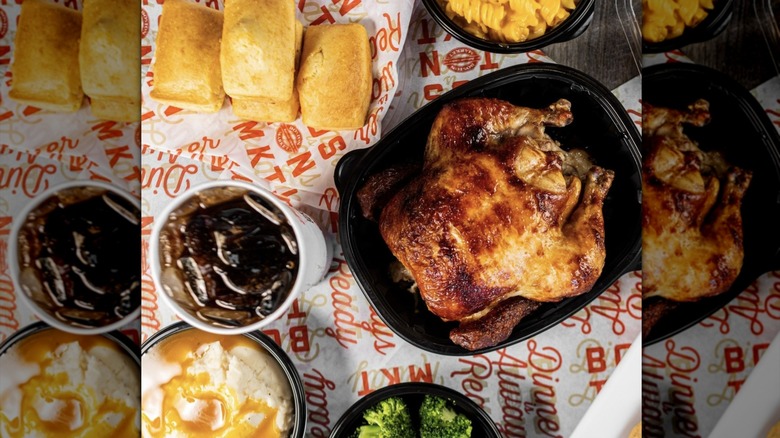Beloved Chain Restaurants We Might Sadly Lose In 2025
Since the COVID-19 pandemic, the restaurant industry has been in a post-apocalyptic state. Fast-casual chains that were once giants of the scene were never the same. Prices soared, food quality suffered, and their survival became uncertain. Recently, Boston Market had no choice but to admit it was hanging by the thinnest of threads, and its descent into extinction is likely to happen sooner than later. Several other well-known chain restaurants may follow suit in 2025.
Even if you don't love chain restaurants, it's hard to imagine a world without their familiar comfort. Starving on a road trip? Oh look, there's a sign for Denny's — well, at least for now. Red Lobster isn't going to win any James Beard Awards, but you have lunch there with your grandma there because it's a tradition. Yet traditions, no matter how sentimental, aren't impenetrable to the hands of time.
Maybe you're a foodie who disses chain restaurants in passing (relatable), but it's sad to think about them falling off the face of the earth. The restaurants on this list are struggling to survive in 2024, and though some have been around for generations, they might not be long for this world. Will these chains live to see 2025 through? The uncertainty is real.
Denny's
Denny's has been around since the 1950s, and in 2024, the diner is really showing its age. Consistently declining sales have prompted Denny's execs to announce the closure of 150 underperforming locations across the U.S. — which accounts for 10% of its restaurants. The shutdowns won't happen all at once. About a third of the Denny's slated for closure will shutter by the end of 2024, the remaining locations will depart in 2025.
When COVID-19 hurt the chain's foot traffic, business never fully recovered. Denny's, known as a family restaurant by day and a night owl spot after dark, depends on in-house dining to turn a profit. Couple that with inflation and you've got a perfect recipe for financial struggle. To make matters worse, after the October 2024 announcement Denny's stock fell 17% to $5.47 a share.
Denny's has around 1,525 locations, with 167 of them operating abroad. Most of the Denny's locations that are closing have struggled because they're old and in some cases, the neighborhoods they were built in are no longer commercially viable for a diner-style restaurant. As for the locations that have lagged in sales but will remain open, the company plans to implement an improvement plan. More robust marketing efforts at the local level, reviewing lease terms, and bettering the employee training program are all part of Denny's strategy to prevent further threats to the beloved chain's future.
Buca di Beppo
In August 2024, Buca di Beppo buckled under mounting financial pressures and filed for Chapter 11 bankruptcy protection. Buca di Beppo's sad sales numbers were a motivating factor in the filing. So was the fact that the restaurant chain was $38,986,453.54 in the hole with its lender, Main Street Capital Corporation, and struggled to pay utility bills for its restaurants. Unpaid compensation owed to past and present employees totaled over $3 million.
The early '90s were rosier times for the Minneapolis-founded chain. Rather than try to imitate the mid-century red sauce Italian joints that inspired the chain, Bucca di Beppo became the kitschy caricature version. Christmas lights snaked around the retro photographs cluttering the walls. Portions were intentionally oversized, the atmosphere never subdued. When the restaurant expanded into a dozen locations in 1996, each one was successful. Around then, a new CEO stripped much of the playfulness form Bucca di Beppo's decor while also cutting corners in the kitchen. It was an early red flag.
Nevertheless, Buca di Beppo was acquired by Planet Hollywood in 2008 and continued expanding. Fast-forward to the post-COVID era and Buca di Beppo was coming undone. Sales steadily declined as food and labor costs rose. In 2024, Bucca di Beppo closed 18 locations — 12 shuttered in July alone.
Red Lobster
If any chain knows the difficulties that exist in the family restaurant business it is Red Lobster. The seafood chain's professional woes have played out very publicly, from the marketing fail that was all-you-can-eat shrimp to its Chapter 11 bankruptcy protection filing in May 2024. Shortly before approaching the court, Red Lobster closed 93 of its restaurants in one day and claimed to be saddled with over $1 billion in debt. As part of its restructuring plan, Red Lobster closed 23 more locations in August 2024.
Some of Red Lobster's pitfalls were the result of bad marketing. In 2003, Red Lobster advertised a $22.99 "Endless Crab" promotion and lost $3.3 million in under two months. Desperate to bring people into its restaurants post COVID, Red Lobster launched $20 "Endless Shrimp" in 2023. This time the promotion drained $11 million.
Two bad promotions don't make a chain self-destruct. Red Lobster's mismanagement under major shareholder Thai Union turned Red Lobster into a shell of its former self (which was also a shell, but a much more successful one). Thai Union's aggressive focus on cost-cutting took Red Lobster's reputation from hero to zero. In early 2024, Thai Union agreed to walk away from Red Lobster in exchange for a $530 million write-off. Red Lobster will enter 2025 with improved management and a streamlined fleet of restaurants. Will these efforts be enough?
MOD Pizza
Seattle-based chain MOD Pizza opened in 2008 and its expansion happened quickly — maybe too quickly. In July 2024, it was suspected that the fast casual eatery was contemplating a bankruptcy filing in order to get its dire financial situation under control. MOD Pizza ("MOD" stands for "made on demand") amassed over 500 locations, but 44 of them closed in 2024. When speculation on MOD Pizza's potential move toward bankruptcy protection hit the media, the chain kept its plans close to the vest. Before July's end, MOD Pizza announced it had been acquired by Elite Restaurant Group.
MOD Pizza was lucky to find a buyer without having to go to court, but that doesn't mean it's out of the woods quite yet. Although MOD Pizza offers a ton of customization options with its pizzas and salads (something today's consumers expect from fast casual eateries), its rapid rate of growth and the demand for its food didn't match up. Elite Restaurant Group aims to refresh MOD Pizza's branding, improve the customer experience, and hopefully get the funds flowing again. The specifics of this reinvigoration plan aren't widely known, but MOD Pizzas continue to close. In November 2024, a location in Cincinnati, Ohio said goodbye.
Applebee's
The writing has been on the wall for a while now for sit-down mega chain Applebee's. In the restaurant chain rat race Applebee's has fallen short of the competition — closing 46 locations and opening just 10 new ones in 2023. A year later, Applebee's parent brand Dine Brands Global announced that another 25 to 35 locations will close.
Applebee's has around 2,000 locations throughout the U.S. and was recently confronted with a hiring crisis. Applebee's had to resort to offering a free appetizer to applicants over 18 who applied for a position with the chain on National Hiring day. As Applebee's continues to test and launch promotions and new menu items to varying degrees of success, Dine Brands has something else in mind to help save the troubled chain.
For some time, Dine Brands has floated the idea of building Applebee's and IHOP combination restaurants. IHOP is one of Dine Brands' restaurant chains that has done well with menu revamps and overall growth. Between both restaurants' menus there is bound to be something to satisfy customers of diverse tastes. Other chain mashups, like Auntie Annie's and Cinnabon or Taco Bell and Long John Silver's have been set into motion over the years, so it's a viable pitch. Prototypes for Applebee's x IHOP are in the works. Could this one-two punch save Applebee's from ruin? We'll have to wait and see.
Rubio's Coastal Grill
Rising costs of doing business in a highly competitive market have been a bit too much for Rubio's Coastal Grill. In June 2024, the California-based chain answered to its shuttering of almost 50 locations by filing for Chapter 11 bankruptcy protection. With 86 locations still in business, Rubio's Coastal Grill has justified the bankruptcy protection as a means to seek a new business investor while attempting to run the restaurants it still has in as normal a fashion as possible.
This isn't Rubio's first tango with going broke. The chain first filed for Chapter 11 in 2020 after closing 26 locations. The decision resulted in its acquisition by Mill Road Capital and a renewed hope that the eatery, which specializes in Baja-inspired fish tacos, burritos, bowls, and salads would see the other side of the COVID-19 pandemic. Unfortunately, the efforts made did not elevate Rubio's beyond near-extinction. In better times, the company, established in 1983, employed over 4,000 workers across California, Arizona, Colorado, Nevada, and Utah. Restoring the chain to its former glory in 2025 will be a feat for the ages.
World of Beer
Time has not been kind to World of Beer. In the early 2010s, the craft-brew chain was a darling on the fast casual circuit. Its early success was an incentive for the company to quickly grow its nationwide presence – something that was made possible by franchisees. As the restaurant industry at large engaged in post-COVID cleanup, World of Beer's cracks were exposed. The money wasn't there and neither were the customers. Contentious relations between World of Beer and its franchisees put oil on its smoldering doom.
A $25.6 million debt and the closing of 14 locations left World of Beer very vulnerable. In August 2024, the company filed for Chapter 11 bankruptcy protection. Just 33 World of Beer locations remain. World of Beer's goal in filing for Chapter 11 is the same as every other chain restaurant that goes that route. It seeks a bailout by a wealthy corporation so that it can consolidate its debt and draft plans for a promising future. There hasn't been much reported on how World of Beer will save itself in the difficult sit-down casual sector. Will World of Beer be clinking glasses through 2025? It's a heady maybe.
Sticky's Finger Joint
Sticky's Finger Joint is one of the newer chains in danger of closing for good in 2025. Its first location opened in 2012 in Manhattan's Greenwich Village with the goal of creating high-quality, hand-breaded chicken fingers with a creative selection of housemade dipping sauces. The concept caught on and Sticky's began expanding in New York City. By 2019, Sticky's opened its first location in New Jersey and by December 2020 had expanded into Philadelphia. In 2021, Sticky's problems became hard to ignore. The Philadelphia location shuttered within five months. Efforts to break into franchising didn't take off. In April 2024, the company filed for Chapter 11 bankruptcy protection.
Although Sticky's powered through the quarantine phases of the pandemic, the company never fully bounced back. Weekday foot traffic near Sticky's NYC locations experienced a significant decrease due to many of the city's workers switching to remote schedules. To combat the loss in customers, Sticky's increased prices, which wound up alienating customers even more. Sticky's corporate office shut down in early 2021 in effort to curb operating costs and broke its lease to do so. The landlord sued — and won.
The lawsuit over the broken lease cost Sticky's $600,000. In 2022, the company was sued again, this time by a barbecue chain called Sticky Fingers. The claim was trademark infringement. The courtroom drama has proven financially disastrous. Ahead of the Chapter 11 filing, several locations in New York and New Jersey closed. Currently, 10 Sticky's locations remain.
Rōti
When Rōti came on the scene in 2007 it strived to fill the gap in the fast casual segment for customers looking for healthy quick eats with a Mediterranean flair. The brand offers customizable options by way of bowls, salads, and pitas. This format has served chains like Chipotle, Moe's, and others well, so why is Rōti the one in danger of vanishing in 2025?
Rōti filed for Chapter 11 bankruptcy protection in the summer of 2024. Prior to COVID-19, Rōti was growing rapidly, but its good fortune appears to be running out. Nearly half of its locations have closed since 2020. Execs at Rōti maintain that the filing will help keep the troubled chain afloat. Rōti cites a drop in sales due to much of its customer base now working from home. The chain hopes to seek new investors to replenish its dwindling financials, but this hasn't happened yet.
For now, Rōti has decided to keep business as usual. Restructuring has been part of the conversation. The chain currently operates in Illinois, Minnesota, and Washington, D.C., plus a single location in Chevy Chase, Maryland. Previous expansion efforts in Maryland and New York City died off in the light of the company's current struggles.
TGI Fridays
Chain restaurant veteran TGI Fridays is well-acquainted with financial struggle at this point. The chain, which operates nearly 700 locations worldwide, first opened in Manhattan in 1965. Now, TGI Fridays prepares for 2025 with bated breath. To stop the financial bleed, the company decided to close 50 of its U.S. restaurants across 12 states by the end of 2024.
As of November 2024, TGI Fridays Inc. has begun the Chapter 11 bankruptcy protection process. In order to restructure, TGI Fridays is borrowing a sum of $5.9 million. Meanwhile, franchisees are panicked that the $49.7 million issued in unredeemed gift cards won't be reimbursed by TGI Fridays Inc., as the gift card credit massively exceeds what the company has borrowed.
In the face of inflation, labor shortages, and the ever-changing landscape of the fast casual food industry, TGI Fridays hasn't found its footing. Part of TGI Fridays restructuring plan will likely include closing additional restaurants as a way to trim costs. With U.S. locations down 25% already, the road to redemption won't be easy.
Tijuana Flats
Tex-Mex purveyor Tijuana Flats might not make it far into 2025. By April 2024, the chain closed 40 locations and racked up $19 million in debt. A 2021 menu expansion — likely a knee-jerk reaction to COVID-19's destruction — did more harm than good as the new items required more equipment and manpower to execute properly. The high-risk menu strategy crumbled under Tijuana Flats' dwindling customer base.
Tijuana Flats declared bankruptcy in the spring of 2024 and was sold to Flatheads LLC. All of this was done in the name of damage control, but it may have been too little too late. The chain got its start in Florida in 1995, when the customized burrito concept wasn't as crowded by the likes of the Moe's, Chipotles, and Qdobas of the world. In the wake of Tijuana Flats' bankruptcy filing, execs have expressed a hopeful outcome. Whether or not this sentiment is just a smile in the face of adversity has yet to be known.
BurgerFi
An unforeseen number of restaurant chains filed for bankruptcy in 2024, and it left other chains who had managed to conceal their issues shaking in their boots. BurgerFi, a fast casual eatery established in Fort Lauderdale, Florida in 2011 was one such place. From the get-go, BurgerFi boasted its use of all-natural, antibiotic-free meats and fresh, vegetarian-friendly options. The approach was right in step with the demands of the most modern fast casual chains, and was awarded accolades from reputable institutions in the process. Yet it hasn't been enough.
In July 2024, BurgerFi's reported projected loss of $18.4 million in a single quarter raised alarm bells. Word spread that if BurgerFi couldn't secure financing from another lender, it wouldn't be long for this world. By September 2024, BurgerFi was forced to face the music. It filed for Chapter 11 bankruptcy protection in hopes that a reorganization of funds would allow the company to continue operating its locations as normal. Franchisee locations of BurgerFi and its sister brand Anthony's Coal Fired Pizza & Wings were excluded from the Chapter 11 filing.
In an effort to salvage the brand, BurgerFi has closed 19 locations. About half of the brand's empire, comprising well over 100 restaurants, is run by franchisees. As for the culprits that contributed to BurgerFi's downfall? The company names the usual suspects: a drop in same-store sales, rapid employee turnover, and a menu in need of revamping.
Boston Market
The future looks grim for Boston Market. Founded in 1985 as Boston Chicken, Boston Market has enjoyed massive popularity in the fast casual space. Families looked to its shareable portions of rotisserie chicken and sides as an easy alternative to home cooking. Prices were fair and the food seemed more wholesome than what the competition was selling. McDonald's bought Boston Market in 2000 for $173.5 million. Less than 10 years later, it was sold to Sun Capital. Over 500 Boston Markets operated across 28 states in 2009. At one point there were 1,200 locations. Now, just over 20 are left.
Boston Market's fall has been long. Those competitive prices meant a drop in food quality, which may have hurt profits long-term. Grocery store rotisserie chickens thwarted the attention of the chain's family-minded consumers. A rise of customizable quick-eats from the likes of Chipotle, Qdoba, and others aligned better with modern customers' evolving tastes. Sun Capital offloaded the chain to Rohan Group in 2020. Rohan's owner Jay Pandya allegedly ran Boston Market into the ground.
Pandya's mismanagement of company funds were reportedly exploitative — and illegal. Careless overexpansion resulted in sky-high debts that went unpaid. Lawsuits piled up as locations shuttered by the dozens. Employees in some locations went unpaid while Pandya — according to lawsuits — continued to line his pockets. Of the 35 Boston Market locations listed on the company website, 22 appear to be in business.


